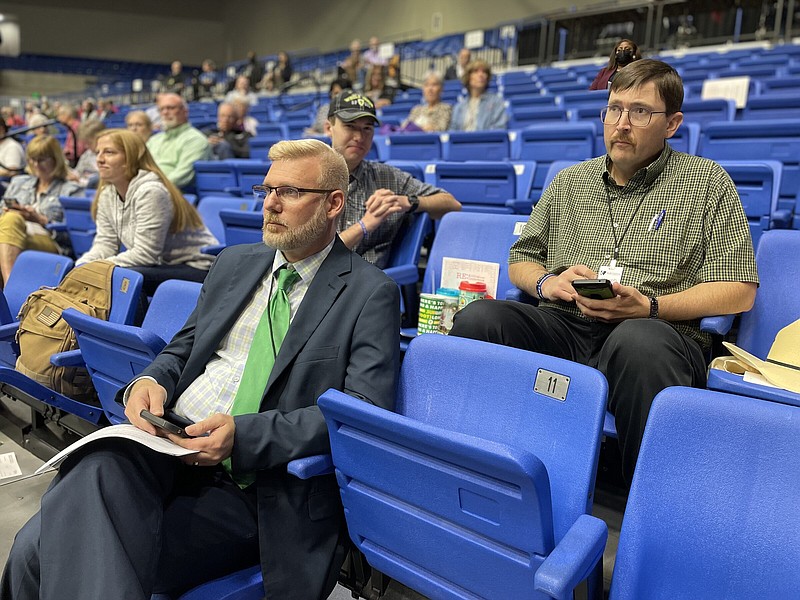Dozens more Arkansas United Methodist churches have voted to sever ties with the denomination and are finalizing separation agreements with the Arkansas Conference's board of trustees.
On May 13 in Garland County, Methodist clergy and lay members from across the state will decide whether to let the congregations leave.
As of Wednesday, the paperwork for 20 of the congregations had been posted on the conference's website at arumc.org/may-2023-annual-conference-special-session.
That figure will likely grow substantially as the vote nears.
"We expect to have between 75-100 churches that will have completed the [Arkansas United Methodist Conference] discernment and disaffiliation process and be on the ballot seeking ratification at the May Special Session of the Annual Conference. The Annual Conference will meet next Saturday in Hot Springs in Horner Hall of the Convention Center at 10 a.m.," conference spokeswoman Amy Ezell said Tuesday. "As always, we pray for a peaceful and loving resolution."
It requires the support of a supermajority of a congregation -- two-thirds of its professing members present and voting -- for it to enter the disaffiliation process.
Seventeen of the 20 on the list voted unanimously to disaffiliate. Some have already dropped "United Methodist" from their names.
It includes Pine Bluff First United Methodist Church, which voted 108-48 for disaffiliation; Greenbrier First United Methodist Church, where the vote was 62-30 in favor of disaffiliation, and Midland Heights United Methodist Church in Fort Smith, which voted 54-0 to break away.
It now calls itself Midland Heights Church.
Other Arkansas congregations have already formally parted ways.
At a special session in November, clergy and lay members ratified 35 disaffiliation agreements, but withheld approval of those submitted by Jonesboro First United Methodist Church, Searcy First United Methodist Church and Cabot United Methodist Church after dissenting members alleged that the process in those communities had been unfair.
The Jonesboro and Searcy congregations are now engaged in litigation with the conference. Most active members of the Cabot congregation ultimately walked away, opting to start a new, independent church.
Even with the departures, the state still has 564 United Methodist churches with membership surpassing 115,000 people, according to the conference's website.
After decades of disagreements over human sexuality, church discipline and scriptural interpretation, the United Methodist Church, the nation's second-largest Protestant denomination, is facing schism.
Nearly 2,500 of its roughly 30,000 congregations have split away since 2019, according to a recent tally by UM News, the denomination's official news agency.
U.S. membership, as of 2020, was about 6.3 million.
Departures have been steepest in southern states, with Texas losing the most -- more than 550.
Normally, Methodist congregations hold their property in trust for the benefit of the entire denomination. Pastors and congregations are free to leave, but they can't take the property with them.
Paragraph 2553 of the denomination's Book of Discipline, approved in 2019 at a special session of its general conference in St. Louis, allowed local churches to disaffiliate over "issues related to human sexuality."
The provision sunsets Dec. 31.
Once a church votes to disaffiliate, it must sign an agreement with the state conference's board of trustees.
Among other things, the agreement requires breakaway congregations to pay an additional tithe based on their income over the past 12 months.
They also must pay a pro rata share of the conference's outstanding pension obligations.
Before it can take effect, any agreement must be ratified by clergy and lay people at a regular or special session of the annual conference.
In most of the country, ratification has been a mere formality. But in Arkansas, opponents of disaffiliation have successfully prevented some of the state's largest congregations from leaving.
In addition to the Pine Bluff, Greenbrier and Midland Heights congregations, others on the May 13 agenda include:
Adona, Altheimer, Chickalah, Dumas Memorial, Harmony Emmet, Harmony Grove, Hebron (New Edinburgh), Horatio, Liberty Hall, McNeil, Mountain View (Mena), Naylor, New Salem, Pleasant Ridge, Wesley (Cotter), Wye Mountain and the United Methodist congregation in Plumerville.

